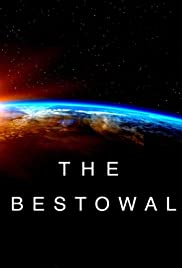
THE BESTOWAL
US, 2018, 90 minutes, Colour.
Sam Brittan, Sharmita Bhattacharya.
Directed by Andrew de Burgh.
This is a film written and directed by Andrew de Burgh, in his 20s. A man of international experience, born in England, English father, Indian mother, and internationally travelling as he grew up. He has appeared as an actor, directed short films, and declares that he is a partial for action adventure spectaculars.
This is not immediately evident from The Bestowal. Rather, this is a very quiet film, three acts and an epilogue, but the three acts taking place in a room, generally with close-ups of each of the protagonists and their conversations. There is an epilogue which goes outdoors,, gazing at sky and planets in the distance.
And, there is no action to speak of in the film except for the conversations, action of the mind and of the emotions, the director says ‘cerebral’ and ‘socially conscious’. The emphasis is on words, articulation of ideas, words in conversation and discussion. The screenplay demands listening on the part of the audience rather than watching, something the equivalent of a radio experience but the audience able to look at and read the body language.
The focus is on a man who has suicidal thoughts, is dissatisfied with his life which has been busy and successful – but lacks fulfilment, is incomplete. He experiences a visitor from another dimension, Death. She comes in the form of a beautiful woman, dressed immaculately in blue, echoes of the Indian background of the actress.
The man interacts with Death, discussing the philosophical implications of life and its meaning, further discussions about the cosmos. The man decides to live and will meet Death in decades to come. After the first encounter, the man travels, discovers the world and people, their troubles and needs and does his best to respond to them. At a third visit, there is a possibility of reassessing his life and how he has responded to the challenges offered him by Death.
Finally, there is a brief epilogue with the couple sitting, life achieved, but still reflecting on life and its meaning.
1. A small, independent film? Intended audience?
2. A film of dialogue, a focus on words, exploration of the meanings, philosophical and cosmological implications? Discussion?
3. The basic sets, interiors, close-ups of the characters? The epilogue, an outer world, the cosmos, planets? The musical score?
4. A film in three acts, plus an epilogue? The passing of time, decades? The background of the events in Steven’s life?
5. Steven, his age, the meaning of his life, his work, reassessing, suicidal? His work and activities, looking for meaning, a good man, his hopes?
6. Death, the presence, interdimensional, female, beautiful, her clothes, the Indian background? A capacity for listening, challenging? Promise of
future meetings?
7. Steven returning, Death and her absence? The years passing, his age, selfless, travel, experience of the world and its problems, Death and her reappearance? Listening to what Steven had achieved? Continued challenge, advice? Her role as a sounding board for him?
8. The third visit, Steven and his life, Death’ s continued reappearance? Final discussions?
9. Audiences interested in the philosophical interpretation of life, its meaning? The detail of the exploration? The universe, life before the Big Bang? Life in other parts of the universe? Death and her role of moving through the dimensions? Steven and the ultimate meaning of his life?
10. The epilogue, the bond between Steven and Death, their sitting, talking, the universe, the vision of the planet – their going outside, a heavenly experience?